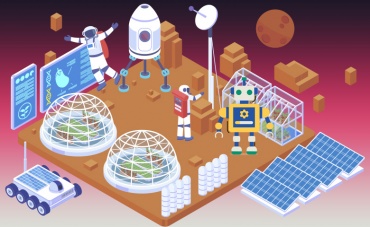How Can AI and Quantum Computing Develop Space Security?

Space technology has undergone a revolution thanks to advances in AI and quantum computing, creating new opportunities for space exploration. These technologies do, however, also carry a number of serious risks, especially with regard to space warfare. Space-based espionage, a new arms race, and the development of autonomous weapons systems are all possible outcomes of the potential misuse of AI and quantum computing.
Cyberattacks on space-based systems could be one of the main dangers of artificial intelligence (AI) and quantum computing in space. Attackers may be able to launch more sophisticated cyberattacks that are harder to stop and defend against if AI and quantum computing are used in space. Another significant risk is the potential for space-based espionage, which could spark a new arms race as nations compete to build and use sophisticated space-based surveillance systems.
International standards and guidelines must be established for the advancement and application of AI and quantum computing in space in order to reduce these risks. Governments must cooperate to make sure that these technologies are only applied for non-military or non-spying uses. Additionally, they must create global legal frameworks that can adapt to the advancement of new space-based weaponry and technologies.
Investing in the creation of sophisticated cybersecurity safeguards for space-based systems is a crucial additional step. In order to protect space-based systems from cyberattacks, it is essential to develop resilient and strong cybersecurity measures. Furthermore, it is crucial to foster cooperation and communication between different parties involved, including international organizations, governments, researchers, businesses, and civil society groups.
The public must be made aware of the dangers that artificial intelligence (AI) and quantum computing pose in space, so it is crucial to invest in education and awareness programs. The importance of cybersecurity and potential dangers to our democratic systems and financial stability are just a few of the topics that need to be brought up in this context. Additionally, it is crucial to make investments in the training of a skilled workforce that can contribute to the creation and application of solutions to reduce the risks that AI and quantum computing pose in space.
In conclusion, there are both significant risks and benefits associated with the use of AI and quantum computing in space. While these technologies have the potential to revolutionize our understanding of the universe, they also carry a significant risk in terms of the development of autonomous weapons systems, space warfare, and espionage. To ensure the security of space-based systems, it is essential to establish global standards and guidelines for their development and application as well as to make significant investments in cutting-edge cybersecurity measures.
Using the most recent studies and professional opinions in the fields of cybersecurity and space technology, this article serves as a one-of-a-kind source for publication. With the use of AI and quantum computing in space, it is hoped that this article will increase awareness and motivate decision-makers, academics, and business executives to take action.
An Analysis by Pooyan Ghamari, Swiss Economist with Expertise in the Digital World
Comments are closed.